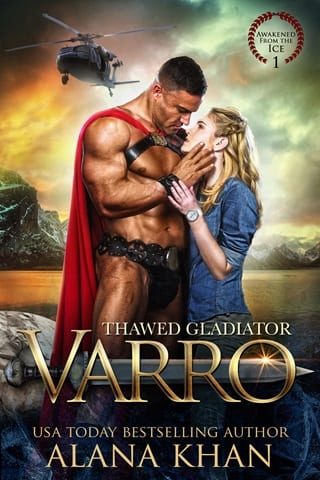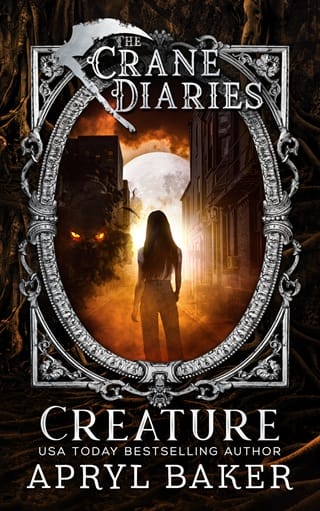24. Chapter Twenty-Four
Chapter Twenty-Four
M arcus Fabius Varro
I’ve eaten everything Laura has put in front of me for the past week, always being mindful not to take more than my share. This little compound has grown smaller by the day. I count laps as I walk from our tent through the larger equipment room to the men’s tent and back again. I’ve worked my way up from four hard-fought laps the first day to five hundred yesterday.
“I’m going to explore this island.” The words burst from me, not so much a request but an announcement. The thought of one more lap in this confined space threatens to drive me to madness.
I’ve washed as best I can, shaved with the novacula Laura found in one of the men’s lockers, and done everything I could in the small space to distract myself. Because Laura’s convinced we’re doomed to starve, I need to see for myself if our situation is truly as dire as she believes.
I can see the argument forming in her eyes, her body tensing as she prepares to argue that I’m not healthy enough to leave our compound. In response, I fix her with the same steely glare I once used to intimidate my opponents in the arena. Her brown eyes widen, and she presses her lips together, clearly abandoning any notion of forbidding me. As a peace offering, I ask, “Want to come with me?”
“Sure,” she agrees, seemingly relieved at the invitation. “I know I should have explored the island sooner, but I didn’t want to go inland for fear of missing a passing boat.”
I watch as she layers clothes on, scoffing at her need to be warm until I recall the biting cold on the last leg of my trip on the Fortuna , right before lightning struck us and we sank. After a trip to the men’s tent, where I pull on layers of disgusting-smelling clothing, we leave the confines of the compound.
The world outside is a stark, gray landscape. A fine mist of snow swirls through the air, stirred up by the relentless wind from the blanket of white covering the ground. It reminds me of crossing the Pyrenees, the only other time I’ve witnessed more than a skift of snow.
The overcast sky makes it impossible to determine the sun’s position, so I can’t determine north from south. I take note of the terrain to orient myself as we set off.
“Honestly, I thought the island was smaller than this,” Laura comments after a while, her breath forming small clouds in the frigid air.
“This is good,” I reassure her. “The more land we have, the better our chances of finding fresh water and game.”
Beside me, Laura nods, looking about with clear, determined eyes. She walks along the sand dunes, slowly rising to brush-covered hills and sparse trees.
I’m glad she has a healthy body. Certainly she’s of marrying age in this odd culture, yet she’s made no reference to a husband. Her life as a free woman must provide her with enough coin to live comfortably. I wonder why her father would ever let her travel away from home and work with a rogue like Garrison.
As we walk in pleasant silence, I notice the forms of plant life, so different from Hispania or Rome. Hardy evergreens with needles instead of leaves dot the landscape, their branches sagging under the weight of snow. Thick patches of lichen cling to exposed rocks, providing splashes of muted color against the white backdrop. In the distance, I spot a cluster of stunted trees with pale, white bark, a stark contrast to the surrounding gloom.
“See this?” I point to tracks in the snow. “Little mammals. Possibly lepores .”
“Rabbits. I could swear I’d seen tracks!” Laura’s face lights up with joy. “I was so terrified that I brought you back from the dead, only to starve you to death.” Tears glisten in her eyes, and her shoulders sag with relief. Her concern for my well-being over her own continues to baffle me.
As we crest a small rise, a new sound reaches my ears. “Listen.” I hold up a hand. “Water.”
We follow the sound to discover a small stream, its surface broken by protruding rocks and small eddies. The water moves swiftly, resisting the bite of winter. Nearby, steam rises from a circular pool—a hot spring, its warmth a stark contrast to the surrounding chill.
“Thank goodness!” Laura exclaims. “If it’s drinkable, this will relieve one of my biggest worries.”
We continue our exploration, our spirits lifting with each new discovery. Suddenly, Laura points to something in the distance. “Varro! Look!”
Over the crest of a hillock, a structure comes into view. We quicken our pace, Laura nearly losing her footing in her excitement. I steady her with a hand on her elbow as we approach, noticing how she leans into me for support as though we’ve done this dozens of times.
The building is a small stone cottage, its walls weathered by countless seasons. The wooden door is remarkably still intact, its surface scarred by time and weather. Much of the thatched roof has long since surrendered to the elements, leaving only a framework of wooden beams .
Despite its neglected state, the structure is strategically placed. Nestled between three hillocks, it’s sheltered from the worst of the wind. It speaks to the builder’s foresight that it’s close to both the freshwater source and the shoreline visible in the distance. It reminds me of the shepherds’ huts that were dotted across the hillside where I grew up.
“It looks as though we’re not the first humans to be shipwrecked here,” I muse, my eyes catching a glint of metal half-buried in the snow-dusted earth. I reach down and unearth a rusted device; the Fortuna’s captain called it an astrolabe. I can barely make out its once-intricate engravings. This navigation tool, likely abandoned by long-ago sailors, is a tangible link to others who once stood where we now stand.
Inside the hut, a stone hearth dominates one wall, its blackened interior hinting at the warmth and comfort it once provided. The windows, now empty holes, can easily be covered with the tarps from the compound.
“Too bad I have no idea how to make a roof,” Laura sighs, her gaze traveling over the exposed rafters. “This place would be so much nicer to live in than the compound.”
“I helped my father and neighbors when their roofs needed re-thatching,” I offer, surprised by the memory’s clarity. “That was two thousand years ago, but I think I could remember how to do it.” The smile I give her feels genuine, perhaps my first since awakening in this strange new world.
“Our fuel supply is running low, Varro. I’ve been meaning to tell you my concerns. Without the fuel, there will be no heat in our tent, no way to run any of the machines we might need. That fireplace will let us live more comfortably.”
As we stand in the weathered hut, surrounded by the harsh beauty of this island, a thought occurs to me. Though I would never have wished for this situation, I could see myself building a life here. The challenges are many, but so are the possibilities.
There is fresh running water which is bound to have fish. The shoreline will be filled with shellfish and we’ve found signs of game. Many people start off with less than that. And as I glance at Laura, her face flushed with cold and excitement, I realize that facing those challenges together might not be such a terrible fate after all.
 Fullepub
Fullepub 



